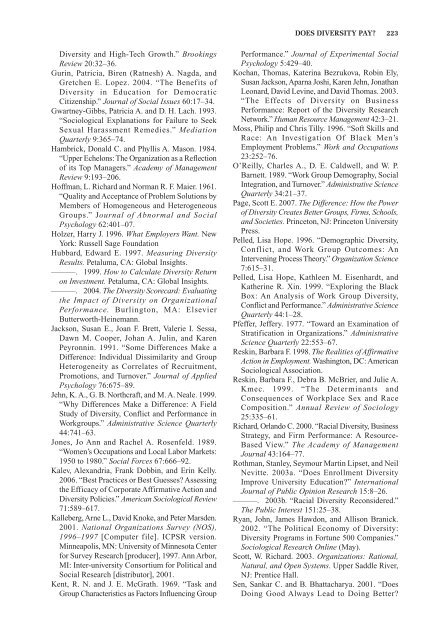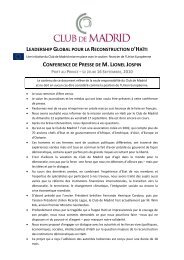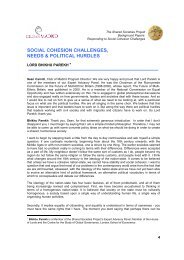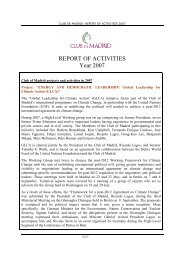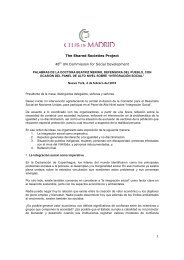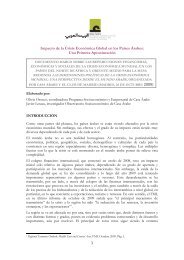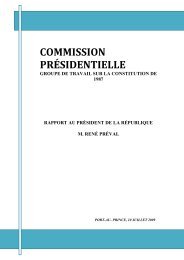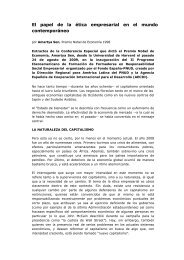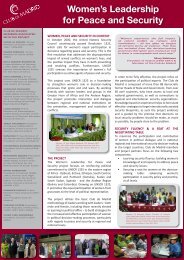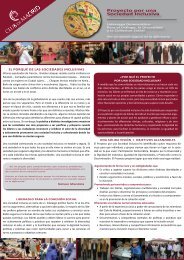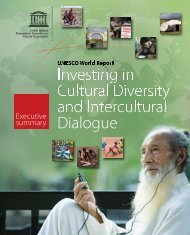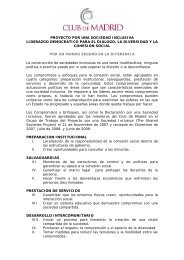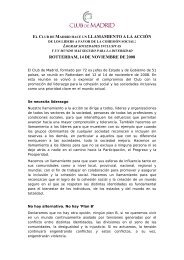Does Diversity Pay? - American Sociological Association
Does Diversity Pay? - American Sociological Association
Does Diversity Pay? - American Sociological Association
You also want an ePaper? Increase the reach of your titles
YUMPU automatically turns print PDFs into web optimized ePapers that Google loves.
DOES DIVERSITY PAY?—–223<br />
<strong>Diversity</strong> and High-Tech Growth.” Brookings<br />
Review 20:32–36.<br />
Gurin, Patricia, Biren (Ratnesh) A. Nagda, and<br />
Gretchen E. Lopez. 2004. “The Benefits of<br />
<strong>Diversity</strong> in Education for Democratic<br />
Citizenship.” Journal of Social Issues 60:17–34.<br />
Gwartney-Gibbs, Patricia A. and D. H. Lach. 1993.<br />
“<strong>Sociological</strong> Explanations for Failure to Seek<br />
Sexual Harassment Remedies.” Mediation<br />
Quarterly 9:365–74.<br />
Hambrick, Donald C. and Phyllis A. Mason. 1984.<br />
“Upper Echelons: The Organization as a Reflection<br />
of its Top Managers.” Academy of Management<br />
Review 9:193–206.<br />
Hoffman, L. Richard and Norman R. F. Maier. 1961.<br />
“Quality and Acceptance of Problem Solutions by<br />
Members of Homogeneous and Heterogeneous<br />
Groups.” Journal of Abnormal and Social<br />
Psychology 62:401–07.<br />
Holzer, Harry J. 1996. What Employers Want. New<br />
York: Russell Sage Foundation<br />
Hubbard, Edward E. 1997. Measuring <strong>Diversity</strong><br />
Results. Petaluma, CA: Global Insights.<br />
———. 1999. How to Calculate <strong>Diversity</strong> Return<br />
on Investment. Petaluma, CA: Global Insights.<br />
———. 2004. The <strong>Diversity</strong> Scorecard: Evaluating<br />
the Impact of <strong>Diversity</strong> on Organizational<br />
Performance. Burlington, MA: Elsevier<br />
Butterworth-Heinemann.<br />
Jackson, Susan E., Joan F. Brett, Valerie I. Sessa,<br />
Dawn M. Cooper, Johan A. Julin, and Karen<br />
Peyronnin. 1991. “Some Differences Make a<br />
Difference: Individual Dissimilarity and Group<br />
Heterogeneity as Correlates of Recruitment,<br />
Promotions, and Turnover.” Journal of Applied<br />
Psychology 76:675–89.<br />
Jehn, K. A., G. B. Northcraft, and M. A. Neale. 1999.<br />
“Why Differences Make a Difference: A Field<br />
Study of <strong>Diversity</strong>, Conflict and Performance in<br />
Workgroups.” Administrative Science Quarterly<br />
44:741–63.<br />
Jones, Jo Ann and Rachel A. Rosenfeld. 1989.<br />
“Women’s Occupations and Local Labor Markets:<br />
1950 to 1980.” Social Forces 67:666–92.<br />
Kalev, Alexandria, Frank Dobbin, and Erin Kelly.<br />
2006. “Best Practices or Best Guesses? Assessing<br />
the Efficacy of Corporate Affirmative Action and<br />
<strong>Diversity</strong> Policies.” <strong>American</strong> <strong>Sociological</strong> Review<br />
71:589–617.<br />
Kalleberg, Arne L., David Knoke, and Peter Marsden.<br />
2001. National Organizations Survey (NOS),<br />
1996–1997 [Computer file]. ICPSR version.<br />
Minneapolis, MN: University of Minnesota Center<br />
for Survey Research [producer], 1997. Ann Arbor,<br />
MI: Inter-university Consortium for Political and<br />
Social Research [distributor], 2001.<br />
Kent, R. N. and J. E. McGrath. 1969. “Task and<br />
Group Characteristics as Factors Influencing Group<br />
Performance.” Journal of Experimental Social<br />
Psychology 5:429–40.<br />
Kochan, Thomas, Katerina Bezrukova, Robin Ely,<br />
Susan Jackson, Aparna Joshi, Karen Jehn, Jonathan<br />
Leonard, David Levine, and David Thomas. 2003.<br />
“The Effects of <strong>Diversity</strong> on Business<br />
Performance: Report of the <strong>Diversity</strong> Research<br />
Network.” Human Resource Management 42:3–21.<br />
Moss, Philip and Chris Tilly. 1996. “Soft Skills and<br />
Race: An Investigation Of Black Men’s<br />
Employment Problems.” Work and Occupations<br />
23:252–76.<br />
O’Reilly, Charles A., D. E. Caldwell, and W. P.<br />
Barnett. 1989. “Work Group Demography, Social<br />
Integration, and Turnover.” Administrative Science<br />
Quarterly 34:21–37.<br />
Page, Scott E. 2007. The Difference: How the Power<br />
of <strong>Diversity</strong> Creates Better Groups, Firms, Schools,<br />
and Societies. Princeton, NJ: Princeton University<br />
Press.<br />
Pelled, Lisa Hope. 1996. “Demographic <strong>Diversity</strong>,<br />
Conflict, and Work Group Outcomes: An<br />
Intervening Process Theory.” Organization Science<br />
7:615–31.<br />
Pelled, Lisa Hope, Kathleen M. Eisenhardt, and<br />
Katherine R. Xin. 1999. “Exploring the Black<br />
Box: An Analysis of Work Group <strong>Diversity</strong>,<br />
Conflict and Performance.” Administrative Science<br />
Quarterly 44:1–28.<br />
Pfeffer, Jeffery. 1977. “Toward an Examination of<br />
Stratification in Organizations.” Administrative<br />
Science Quarterly 22:553–67.<br />
Reskin, Barbara F. 1998. The Realities of Affirmative<br />
Action in Employment. Washington, DC: <strong>American</strong><br />
<strong>Sociological</strong> <strong>Association</strong>.<br />
Reskin, Barbara F., Debra B. McBrier, and Julie A.<br />
Kmec. 1999. “The Determinants and<br />
Consequences of Workplace Sex and Race<br />
Composition.” Annual Review of Sociology<br />
25:335–61.<br />
Richard, Orlando C. 2000. “Racial <strong>Diversity</strong>, Business<br />
Strategy, and Firm Performance: A Resource-<br />
Based View.” The Academy of Management<br />
Journal 43:164–77.<br />
Rothman, Stanley, Seymour Martin Lipset, and Neil<br />
Nevitte. 2003a. “<strong>Does</strong> Enrollment <strong>Diversity</strong><br />
Improve University Education?” International<br />
Journal of Public Opinion Research 15:8–26.<br />
———. 2003b. “Racial <strong>Diversity</strong> Reconsidered.”<br />
The Public Interest 151:25–38.<br />
Ryan, John, James Hawdon, and Allison Branick.<br />
2002. “The Political Economy of <strong>Diversity</strong>:<br />
<strong>Diversity</strong> Programs in Fortune 500 Companies.”<br />
<strong>Sociological</strong> Research Online (May).<br />
Scott, W. Richard. 2003. Organizations: Rational,<br />
Natural, and Open Systems. Upper Saddle River,<br />
NJ: Prentice Hall.<br />
Sen, Sankar C. and B. Bhattacharya. 2001. “<strong>Does</strong><br />
Doing Good Always Lead to Doing Better?


